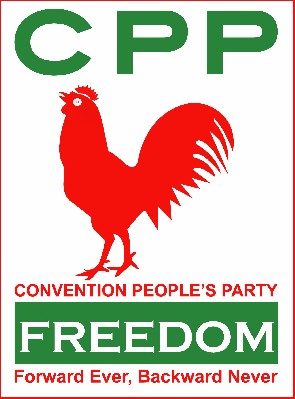
The Convention People's Party (CPP) is a socialist political party in Ghana based on the ideas of the first President of Ghana,Kwame Nkrumah. The CPP was formed in June 1949 after Nkrumah broke away from the United Gold Coast Convention (UGCC).

The Parliament of Ghana is the legislative body of the Government of Ghana.
The National Liberation Movement was a Ghanaian political party formed in 1954. Set up by disaffected Ashanti members of the Convention People's Party,who were joined by Kofi Abrefa Busia,the NLM opposed the process of centralization whilst supporting a continuing role for traditional leaders. It was led by Baffour Akoto,linguist to the Asantehene. The party gained some support in the 1956 Gold Coast general election and became the third largest party in the Assembly with 12 seats,behind the Convention People's Party and the Northern People's Party.

From 1966 to 1979,the nation of Ghana underwent a turbulent era as the Second Republic of Ghana. It began when the government of Kwame Nkrumah was overthrown on February 24,1966 by a military coup.
Kwaku Baah is a Ghanaian lawyer and a politician. He was a deputy minister in the second republic,the minority leader in the third republic and vice chairman of the National Democratic Congress in the fourth republic. He also served as a member of parliament for Nkawkaw Constituency in the second and third Republic of Ghana.
Kofi Badu was a Ghanaian politician and journalist. He served as a member of parliament during Ghana's first republic and a minister of state during the Supreme Military Council (SMC) era and the Armed Forces Revolutionary Council (AFRC) era. As a journalist,he was editor for various newspapers.
Modesto Kwasi Apaloo was a Ghanaian politician. He was a Member of parliament and was the founder and leader of the defunct Anlo Youth Organisation.
Joseph Addison Anyan was a Ghanaian politician and was a member of the first parliament of the second Republic of Ghana. He represented Agona constituency under the membership of the Progress Party (PP).
Kwaku Sekyi-Appiah was a Ghanaian politician who was a member of the first parliament of the second Republic of Ghana. He represented Asikuma-Brakwa constituency under the membership of the progress party (PP).
James Davies-Quakyi was a Ghanaian politician and was a member of the first parliament of the second Republic of Ghana. He represented Mfantsiman-Sebu constituency under the membership of the Progress Party (PP).
Kwame Poku Agyekum was a Ghanaian politician and member of the first parliament of the second republic of Ghana. He represented the Amansie Central constituency in parliament on the ticket of the Progress Party.
Sebastian Kwaku Opon is a Ghanaian politician and member of the first parliament of the second republic of Ghana representing Sefwi Wiawso Constituency under the membership of the Progress Party(PP).
Kwame Agyei Boaitey is a Ghanaian politician and member of the first parliament of the second republic of Ghana representing Ejisu-Juaben constituency under the membership of the Progress Party.
Isaiah Kwaku Osei-Duah is a Ghanaian politician and was a member of the first parliament of the second Republic of Ghana. He represented the Asutifi constituency under the membership of the progress party (PP).
Anane Antwi-Kusi was a Ghanaian politician and member of the first parliament of the second republic of Ghana representing Tano constituency under the membership of the Progress Party.
Alexander Abu Abedi is a Ghanaian politician and was a member of the first parliament of the second Republic of Ghana. He represented the Akropong constituency under the membership of the Progress Party.
Benard Kwaku Mensah was a Ghanaian politician and member of the first parliament of the second republic of Ghana representing Krachi Constituency under the membership of the Progress Party (PP).
Daniel Kwasi Avoke is a Ghanaian politician and member of the first parliament of the second republic of Ghana representing East Dayi Constituency under the membership of the National Alliance of Liberals (NAL).
Azabiri Ayamga is a Ghanaian politician and member of the first parliament of the second republic of Ghana representing Bongo constituency in the Upper Region of Ghana under the membership of the Progress Party (PP).

The Political history of Ghana recounts the history of varying political systems that existed in Ghana during pre-colonial times,the colonial era and after independence. Pre-colonial Ghana was made up of several states and ethnic groups whose political system was categorized by 3 main administrative models;Centralized,Non-centralized and Theocratic states. In the colonial era,the British Empire employed different forms of government among its four territorial possessions in the Gold Coast. Indirect rule was implemented in the late 19th century after its success in Northern Nigeria. From the 1940s,native Ghanaians yearned for more autonomy. This resulted in the several constitutional reforms as well as the creation of the office of the Prime Minister in 1952.




